Multiagent Systems
Multiagent systems combine multiple autonomous entities, each having diverging interests or different information. This comprehensive overview of the field offers a computer science perspective but also draws on ideas from game theory, economics, operations research, logic, philosophy, and linguistics. It will serve as a reference for researchers in each of these fields and be used as a text for advanced undergraduate or graduate courses.
The authors emphasize foundations to create a broad and rigorous treatment of their subject, with thorough presentations of distributed problem solving, non-cooperative game theory, multiagent communication and learning, social choice, mechanism design, auctions, cooperative game theory, and modal logics of knowledge and belief. For each topic, basic concepts are introduced, examples are given, proofs of key results are offered, and algorithmic considerations are examined. An appendix covers background material in probability theory, classical logic, Markov decision processes, and mathematical programming.
Yoav Shoham is a professor of computer science at Stanford University.
Kevin Leyton-Brown is an associate professor of computer science at the University of British Columbia.
CAMBRIDGE UNIVERSITY PRESS
Cambridge, New York, Melbourne, Madrid, Cape Town, Singapore, So Paulo, Delhi
Cambridge University Press
32 Avenue of the Americas, New York, NY 10013-2473, USA
www.cambridge.org
Information on this title: www.cambridge.org/9780521899437
Yoav Shoham and Kevin Leyton-Brown 2009
This publication is in copyright. Subject to statutory exception
and to the provisions of relevant collective licensing agreements,
no reproduction of any part may take place without the written
permission of Cambridge University Press.
First published 2009
Printed in the United States of America
A catalog record for this publication is available from the British Library.
Library of Congress Cataloging in Publication Data
Shoham, Yoav.
Multiagent systems : algorithmic, game-theoretic, and logical
foundations / Yoav Shoham, Kevin Leyton-Brown.
p. cm.
Includes index.
ISBN 978-0-521-89943-7 (hardback)
1. Intelligent agents (Computer software) 2. Electronic data processing Distributed
processing. I. Leyton-Brown, Kevin, 1975 II. Title.
QA76.76.I58S75 2008
006.3dc22 2008012063
ISBN 978-0-521-89943-7 hardback
Cambridge University Press has no responsibility for the persistence or
accuracy of URLs for external or third-party Internet Web sites referred to in
this publication and does not guarantee that any content on such Web sites is,
or will remain, accurate or appropriate. Information regarding prices, travel
timetables, and other factual information given in this work are correct at
the time of first printing, but Cambridge University Press does not guarantee
the accuracy of such information thereafter.
To my wife, Noa, and my daughters, Maia, Talia, and Ella
YS
To Jude
KLB
Contents
Credits and Acknowledgments
We should start off by explaining the order of authorship. Yoav conceived of the project and started it, in late 2001, working on it alone and with several colleagues (see below). Sometime in 2004 Yoav realized he needed help if the project were ever to come to conclusion, and he enlisted the help of Kevin. The result was a true partnership and a complete overhaul of the material. The current book is vastly different from the draft that existed when the partnership was formedin depth, breadth, and form. Yoav and Kevin have made equal contributions to the book; the order of authorship reflects the history of the book, but nothing else.
In six years of book-writing we accumulated many debts. The following is our best effort to acknowledge those. If we omit any names, it is due solely to our poor memories and record keeping, and we apologize in advance.
When the book started out, Teg Grenager served as a prolific ghost writer. While little of the original writing remains (though some does, for example, in on speech acts), the project would not have gotten off the ground without him.
Several past and present graduate students made substantial contributions. (ex post equilibria). Finally, all of the past and present students listed here offered invaluable comments on drafts. Other students also offered valuable comments. Samantha Leung deserves special mention; we also received useful feedback from Michael Cheung, Matthew Chudek, Farhad Ghassemi, Ryan Golbeck, James Wright, and Erik Zawadzki. We apologize in advance to any others whose names we have missed.
Several of our colleagues generously contributed material to the book, in addition to lending their insight. They include Geoff Gordon (Matlab code to generate (Sperners lemma) and Theorem 3.3.21 (Brouwers fixed-point theorem for simplotopes), respectively.
Many colleagues around the world generously gave us comments on drafts, or provided counsel otherwise. Felix Brandt and Vince Conitzer deserve special mention for their particularly detailed and insightful comments. Other colleagues to whom we are indebted include Alon Altman, Krzysztof Apt, Navin A. R. Bhat, Ronen Brafman, Yiling Chen, Yossi Feinberg, Jeff Fletcher, Nando de Freitas, Raul Hakli, Joe Halpern, Jason Hartline, Jean-Jacques Herings, Ramesh Johari, Bobby Kleinberg, Daphne Koller, Fangzhen Lin, David Parkes, David Poole, Maurice Queyranne, Tim Roughgarden, Tuomas Sandholm, Peter Stone, Nikos Vlasis, Mike Wellman, Bob Wilson, Mike Wooldridge, and Dongmo Zhang.
Many others pointed out errors in the first printing of the book through our errata wiki: B. J. Buter, Nicolas Dudebout, Marco Guazzone, Joel Kammet, Nicolas Lambert, Nimalan Mahendran, Mike Rogers, Ivomar Brito Soares, Michael Styer, Sean Sutherland, Grigorios Tsoumakas, Steve Wolfman, and James Wright.
Several people provided critical editorial and production assistance of various kinds. Most notably, David R. M. Thompson overhauled our figures, code formatting, bibliography, and index. Chris Manning was kind enough to let us use the  macros from his own book, and Ben Galin added a few miracles of his own. Ben also composed several of the examples, found some bugs, drew many figures, and more generally for two years served as an intelligent jack-of-all-trades on this project. Erik Zawadzki helped with the bibliography and with some figures. Maia Shoham helped with some historical notes and bibliography entries, as well as with some copy-editing.
macros from his own book, and Ben Galin added a few miracles of his own. Ben also composed several of the examples, found some bugs, drew many figures, and more generally for two years served as an intelligent jack-of-all-trades on this project. Erik Zawadzki helped with the bibliography and with some figures. Maia Shoham helped with some historical notes and bibliography entries, as well as with some copy-editing.
We thank all these friends and colleagues. Their input has contributed to a better book, but of course they are not to be held accountable for any remaining shortcomings. We claim sole credit for those.
We also thank Cambridge University Press for publishing the book, and for their enlightened online-publishing policy, which has enabled us to provide the broadest possible access to it. Specific thanks to Lauren Cowles, an editor of unusual intelligence, good judgment, and sense of humor.
Last, and certainly not the least, we thank our families, for supporting us through this time-consuming project. We dedicate this book to them, with love.
Introduction
Imagine a personal software agent engaging in electronic commerce on your behalf. Say the task of this agent is to track goods available for sale in various online venues over time, and to purchase some of them on your behalf for an attractive price. In order to be successful, your agent will need to embody your preferences for products, your budget, and in general your knowledge about the environment in which it will operate. Moreover, the agent will need to embody your knowledge of other similar agents with which it will interact (e.g., agents who might compete with it in an auction or agents representing store owners) including their own preferences and knowledge. A collection of such agents forms a multiagent system. The goal of this book is to bring under one roof a variety of ideas and techniques that provide foundations for modeling, reasoning about, and building multiagent systems.

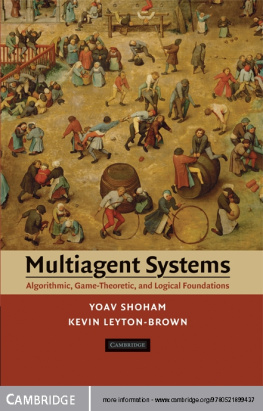

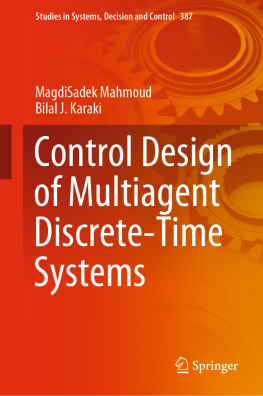
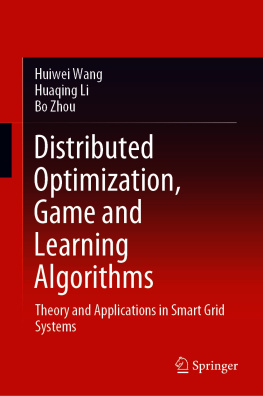
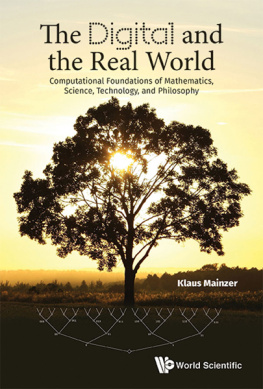
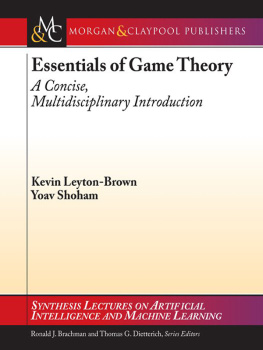
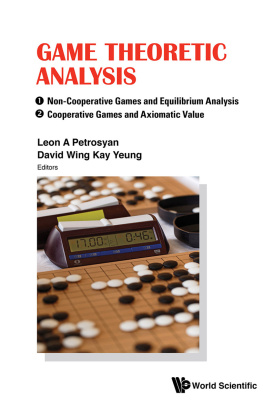
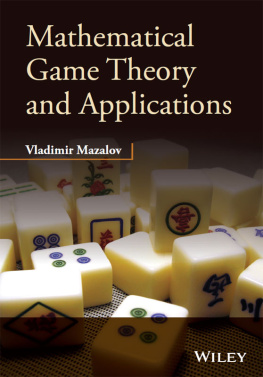

 macros from his own book, and Ben Galin added a few miracles of his own. Ben also composed several of the examples, found some bugs, drew many figures, and more generally for two years served as an intelligent jack-of-all-trades on this project. Erik Zawadzki helped with the bibliography and with some figures. Maia Shoham helped with some historical notes and bibliography entries, as well as with some copy-editing.
macros from his own book, and Ben Galin added a few miracles of his own. Ben also composed several of the examples, found some bugs, drew many figures, and more generally for two years served as an intelligent jack-of-all-trades on this project. Erik Zawadzki helped with the bibliography and with some figures. Maia Shoham helped with some historical notes and bibliography entries, as well as with some copy-editing.